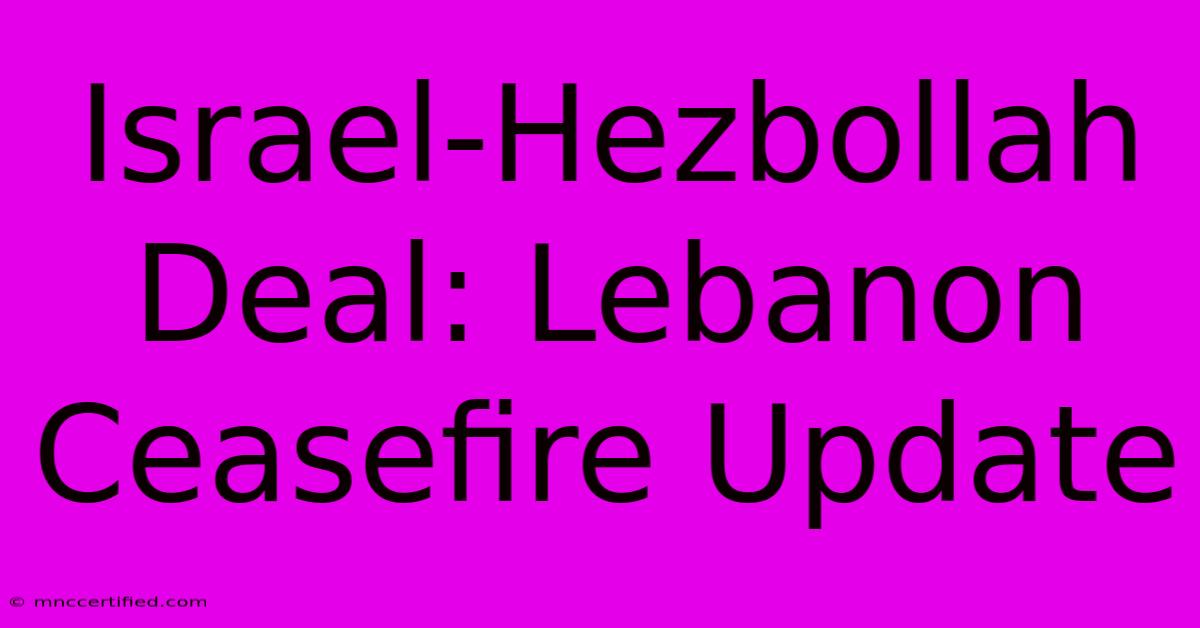Israel-Hezbollah Deal: Lebanon Ceasefire Update

Table of Contents
Israel-Hezbollah Deal: Lebanon Ceasefire Update – A Delicate Balance
The situation along the Israel-Lebanon border remains a complex and volatile issue, constantly shifting based on political maneuvering and military posturing. Recent reports of a potential Israel-Hezbollah deal, aimed at establishing a lasting ceasefire in southern Lebanon, have sparked intense debate and speculation. This article provides an update on the current state of affairs, analyzing the potential implications of such a deal and highlighting the delicate balance involved.
Understanding the Current Dynamics
The Israel-Hezbollah conflict is a long-standing and deeply rooted issue, fueled by historical grievances, ideological differences, and regional power struggles. Hezbollah, a powerful Lebanese Shia militant group, has a significant military presence in southern Lebanon, posing a constant threat to Israel's northern border. Conversely, Israel maintains a strong military presence along the border and has conducted numerous military operations against Hezbollah targets over the years. This ongoing tension creates a volatile environment, with the potential for escalation at any time.
Key Players and Their Interests:
- Israel: Israel's primary interest is ensuring the security of its northern border, preventing Hezbollah from accumulating weapons, and thwarting any potential attacks. A ceasefire, therefore, must guarantee these conditions.
- Hezbollah: Hezbollah aims to maintain its influence in southern Lebanon and its ability to resist Israeli actions. Any deal must ensure its security and operational capabilities are not significantly compromised.
- Lebanon: Lebanon, as a nation, desperately needs stability and economic recovery. A lasting ceasefire is crucial for its economic well-being and to prevent further conflict and displacement.
- International Community: The international community, particularly the United Nations, plays a vital role in mediating and monitoring any potential agreement, ensuring compliance and promoting regional stability. UNIFIL (the United Nations Interim Force in Lebanon) is a key player in this regard.
The Potential Israel-Hezbollah Deal: What We Know
Rumors of an impending Israel-Hezbollah deal have circulated for some time. The specifics remain largely undisclosed, but reports suggest the agreement may involve:
- A De-escalation of Tensions: A mutual agreement to reduce military activities and provocations along the border.
- A Prisoner Exchange: The potential release of Israeli and Lebanese prisoners held by each side.
- Addressing Hezbollah's Military Capabilities: This is arguably the most contentious point, focusing on limiting Hezbollah's weapons stockpile and operational reach within a defined area.
Challenges and Obstacles to a Lasting Ceasefire
Negotiating a lasting ceasefire agreement between Israel and Hezbollah presents significant challenges:
- Mutual Distrust: Decades of conflict have fostered deep-seated distrust between the two parties, hindering the ability to build trust and achieve meaningful compromises.
- Internal Political Dynamics: Both Israel and Lebanon face internal political divisions that could derail any agreement. The strength of Hezbollah within Lebanon also adds layers of complexity to negotiations.
- Verification and Enforcement: Ensuring compliance with any agreement is crucial. Effective monitoring and enforcement mechanisms are necessary to prevent violations and maintain the ceasefire.
The Road Ahead: A Fragile Peace?
The path to a lasting ceasefire remains precarious. While a deal could offer a much-needed period of calm and pave the way for improved regional stability, the inherent complexities and challenges should not be underestimated. Close monitoring of the situation and a commitment from all parties to dialogue and compromise are essential for success. Failure to address core issues could lead to renewed escalation, with devastating consequences for Lebanon and the region. The international community's role in mediating and enforcing any agreement will be paramount in the success or failure of this delicate undertaking. The coming weeks and months will be crucial in determining whether this potential deal translates into lasting peace or merely represents a temporary reprieve from a much larger conflict.

Thank you for visiting our website wich cover about Israel-Hezbollah Deal: Lebanon Ceasefire Update. We hope the information provided has been useful to you. Feel free to contact us if you have any questions or need further assistance. See you next time and dont miss to bookmark.
Featured Posts
-
Pet Simulator 99 Trading Value
Nov 28, 2024
-
O Connell On Adding Daniel To Vikings
Nov 28, 2024
-
Met Eireann Midlands Freezing Fog Warning
Nov 28, 2024
-
Galaxy Investments Los Angeles
Nov 28, 2024
-
Is Your Spotify App Updated
Nov 28, 2024